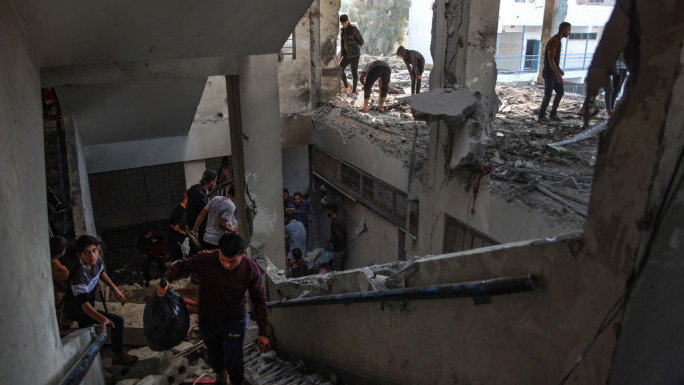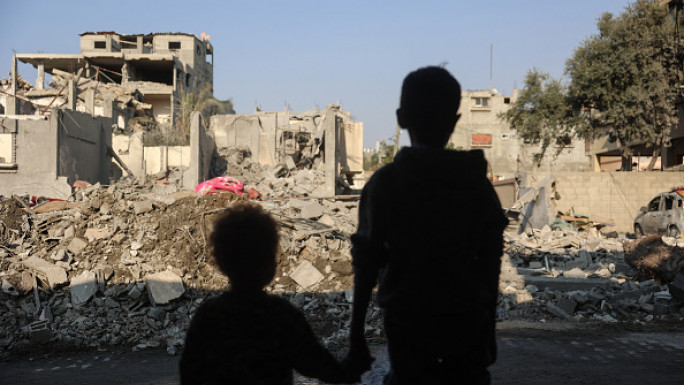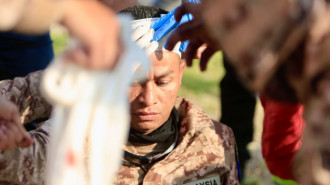'No reason to panic!': Meet the Lebanese student video blogging from Wuhan, coronavirus' ground zero
The streets of the megacity are eerily quiet, in a way that can only be explained by the unfolding cataclysm that has effectively imprisoned Wuhan's 11 million dwellers.
"Greetings from Wuhan!" Adham Al Sayed proclaims out cheerfully into his cameraphone. "Nothing here calls for panic!"
Since late December, Wuhan has continued to lead international news headlines as the source of the new deadly strand of the coronavirus.
International media has reported endlessly on the city, with news bulletins and frontpages reaching a panicked climax when the Chinese government first quarantined Wuhan and then sealed off the whole Hubei province, home to some 58.5 million people.
Despite the emphatic measures of the Chinese government, the spread of the disease has continued, albeit it seems to have slowed down recently according to the WHO.
The 282 reported cases by January 20 had jumped to 28,000 in just 18 days, as further reports of the outbreak's spread in Asia, Europe and America make new headlines.
But the spread of misinformation and speculation about life in Wuhan has been equally viral. Reports that the coronavirus originated in a wildlife market in Wuhan have mutated into racist anti-Chinese narratives spreading across social media.
'I am not afraid'
On the empty roads of a Wuhan neighbourhood, a live video streaming on Facebook shows a man walking through the streets. His head is covered in a black hoodie; his faced covered in a black mask. His voice breaks the piercing silence.
"Everything here is under control!" Adham says. "The roads here are very clean, it's almost like nothing is happening!"
Adham has been documenting daily life in Wuhan through videos shared on his Facebook page.
He arrived in the city from Lebanon five years ago to pursue a PhD in quantitative economics at the Huazhong University of Science and Technology. While foreign countries have called on their citizens in China to return home amid the outbreak of the virus, the young student has made a conscious choice to stay put.
"I am not afraid," he told The New Arab over the phone. "All I need to do is take the necessary precautions, like refrain from going out without a mask on my face and to avoid mixing with anyone who may be infected."
He says his work documenting daily life in Wuhan arose from a desire to counter the negative coverage of a city that has grown dear to his heart. The international press has, in his opinion, been evoking unwarranted fear, horror and despair.
"I am documenting life in Wuhan to debunk rumours and the spread of false information over what is happening in China," Adham said.
"My family and friends in Lebanon were becoming really worried," he says. "So when I document daily life, I am able to reassure them and show the world what is really happening here through a live feed.
"Especially as some people are beginning to think that Wuhan is now a ghost city or that there are dead bodies on the streets. The reality is that despite the lockdown, order and daily life here remains better than it is in many other countries.
"We have not seen a single crime being committed during this period as security and order are still in place," he says. "If this was happening anywhere else in the world, you would suddenly see a rise in prices or a shortage of food and medicine supplies, but in Wuhan, this is not the case.
"So I feel it is my duty to show the world this reality and reassure people."
 |
I feel it is my duty to show the world this reality and reassure people - Adham El Sayed |
 |
Many have praised the efforts by Chinese health authorities to contain the virus. The spring holiday has been extended, keeping schools and businesses closed. The economy is running on the homedelivery of food and goods.
"Our basic needs are being met in terms of food, drink and medicine," Adham says. "The university provides students who do not want to leave their homes with three hot meals every day.
"In addition to that, I had stocked up on some cupboard foods, as I do every year before the start of the spring holiday and Chinese New Year break, when the city is mostly closed around that period anyway."
Still, life is undoubtedly difficult in the large provincial capital. The roads remain mostly empty and eerily quiet; an unnatural state in a city seen as one of China's largest industrial hubs and home to its steel industry.
"The outbreak of the coronavirus has led to the closure of the cinema, stores and other commercial spots, while pharmacies and stores selling food and vegetables have remained open," Adham says.
"The situation is unnatural, particularly in the last few days," he says. "This is not how Wuhan is usually, and its people are not used to having to stop working. What is really happening is a health emergency."
For Adham, the resilience of Wuhan's residents continues to shine through.
"Regardless, Wuhan is still not a ghost town though as it is impossible for life to stop. It has proved to be a city that does not succumb to death or defeat," Adham adds.
Twitter Post
|
A 'war correspondent'
Local media in Lebanon have praised Adham's efforts to show life in Wuhan under a new light.
Some have applauded his courage to stay behind, while others called him a "war correspondent" over his efforts to report from the quarantined city.
Adham says he was approached by some TV channels and news agencies asking him to work for them as a reporter from Wuhan, but he has rejected the offers.
"I want to be free of any restrictions on how I record my videos and what I report on," he told The New Arab. "I want to be free in showing the full picture and speaking to people who reach out to me.
"I did not stay here for a work opportunity," he adds, "I stayed solidarity with this city and its survival and I want to be able to show the world the reality of what is happening in Wuhan."
If the situation becomes more dangerous, however, Adham will then consider leaving.
Yet, the choice between staying in Wuhan and returning home to Lebanon may not simply be a choice between staying in a dangerous place in lieu of one that is safer.
For Adham, China's efforts to counter the virus are far more effective than any protective measures that would be put in place by Lebanon's increasingly ineffectual government - if the virus were to spread there.
The student says that the rampant pollution in Lebanon makes life there just as precarious.
"My hometown of Barja in the Chouf district just southeast of Beirut is not any better off.
I have lost a number of relatives and friends to cancer resulting from the intense pollution surrounding us there."
For now, he will remain put in Wuhan, where he takes preventative measures to keep from contracting the virus.
"We receive daily reminders of the instructions that we need to abide by," he said. "These are to refrain from going out, and if we do go out, to ensure we are wearing a face mask.
"When returning from outside, we are advised to wash our hands thoroughly and to drink plenty of fluids at home."
Adham says he drinks ginger tea with lemon juice, and, of course, a cup of yansoon (anise) tea daily.
"It seems that the Lebanese are destined to live in dangerous places," he says.
Sarah Khalil is a journalist with The New Arab.
Follow her on Twitter: @skhalil1984


![President Pezeshkian has denounced Israel's attacks on Lebanon [Getty]](/sites/default/files/styles/image_684x385/public/2173482924.jpeg?h=a5f2f23a&itok=q3evVtko)



 Follow the Middle East's top stories in English at The New Arab on Google News
Follow the Middle East's top stories in English at The New Arab on Google News


